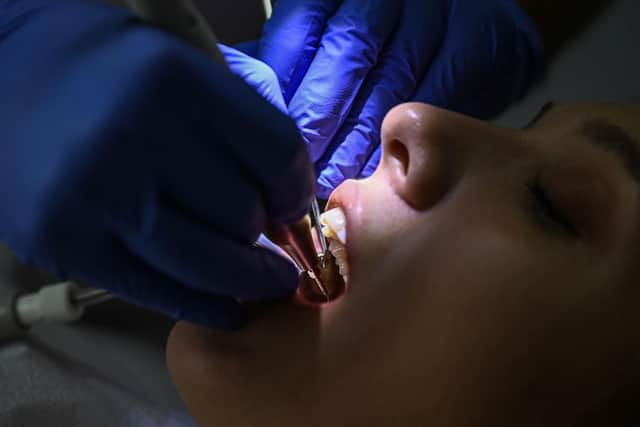Ex-Derry dentist says tooth decay a ‘disease of deprivation’ with 21,000 kids’ teeth pulled in one year
and live on Freeview channel 276
Roz McMullan, British Dental Association NI Chair, revealed 21,000 general aesthetic extractions were carried out on children in 2020.
This was a rate of tooth-pulling three times higher than England.
Advertisement
Hide AdAdvertisement
Hide AdMs. McMullan, a former hospital consultant orthodontist in the Western Trust, said: “Dental decay, like any non-communicable disease, impacts on areas of deprivation.


"Surveys are carried out regularly throughout the UK, generally on five- and 12-year-olds and adults.
"They happen at various intervals. Without going into the details or a lot of figures, we consistently come out as the region with not only the highest number of the population experiencing decay but the worst type of decay within the population that is affected.
"So, there is more tooth decay, missing teeth or fillings within the group that has increased decay...it is a disease of deprivation and a disease that impacts a group at a higher level.”
Advertisement
Hide AdAdvertisement
Hide AdMs. McMullan was providing evidence at the Stormont Windsor Framework Democratic Scrutiny Committee on a looming European ban on dental amalgam.
The prohibition of amalgam or silver fillings, which contain mercury, is due to come into effect from January 1, 2025.
Ms. McMullan and colleagues told the committee the ban is likely to have a major impact on dentistry locally.
The cost of amalgam is expected to spiral as its use and production decreases and supply chains are disrupted.
Advertisement
Hide AdAdvertisement
Hide AdTristan Kelso, BDA NI director, explained: “Under the NHS, dentists are paid £10.62 to place a single-surface amalgam filling.
"Replacing amalgam with alternative materials will come at considerable additional cost, owing to the much costlier materials and the longer time required to place them.”
Ciara Gallagher, BDA NI dental practice committee chair, said that if the dental service was ‘properly funded and dentists had faith in the planning for NHS dentistry, we could probably handle this issue a little bit better’.
"Amalgam is a useful material, and it has an important place, but this would not be such a significant blow if our services were more stable. I will go back to the house-of-cards analogy: if this was on top of a solid house, the strain could be absorbed somewhere else,” she said.
Advertisement
Hide AdAdvertisement
Hide AdMs. McMullan warned that the rate of tooth extraction for children in the North is already very high.
"I just want to reiterate that figure: 21,000 teeth. That is at the end of the spectrum: general anaesthetic extraction...that is at the end of the spectrum. You know the population of children in NI, so 21,000 teeth extracted under general anaesthetic is not a statistic that we are particularly proud of.”
She said society needed to work collectively to improve oral health.
“It is about giving people access to care and healthy choices. People are in economic strife at the moment, as you and I well know, and they are making difficult choices.
Advertisement
Hide AdAdvertisement
Hide Ad“It is important not to blame society. It is about the systems to provide the care so that children do not miss school because they have sore teeth and people can go to work because they are not taking their child for a general anaesthetic to have a tooth out,” observed Ms. McMullan.
Comment Guidelines
National World encourages reader discussion on our stories. User feedback, insights and back-and-forth exchanges add a rich layer of context to reporting. Please review our Community Guidelines before commenting.